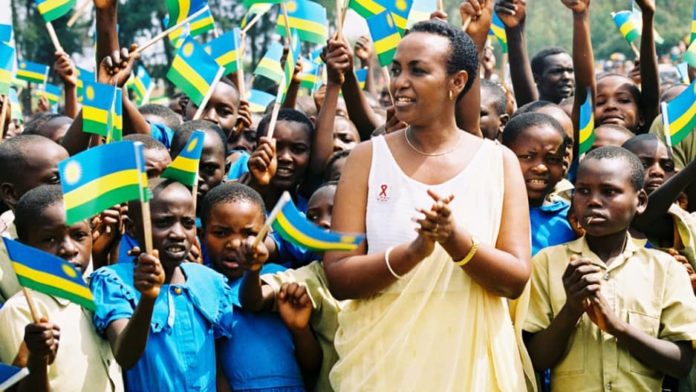When one thinks of role model countries, one doesn’t typically look to the African continent. It isn’t only that protracted conflicts in places like Sudan, Central African Republic and the Democratic Republic of Congo have claimed millions of lives. Rampant corruption and mismanagement, poverty, hunger, and disease continue to thwart Africa’s prospects.
Rwanda, a small, landlocked country in East Africa, unexpectedly stands out for its progress. July fourth is “Liberation Day” in Rwanda. Twenty-five years ago, the country was liberated from the swiftest genocide in history that claimed nearly one million lives. Rwanda’s story though, doesn’t start nor end with the genocide. Today, poverty rates are down, life expectancy is up, and there have been dramatic improvements in areas such as maternal and child mortality. The country has been working to wean itself off foreign aid in favor of a robust private sector, trade and investment.
Fifteen years ago, on the tenth anniversary of the 1994 genocide against the Tutsis’, I made my first trip to the country to help women survivors there rebuild their lives. Upwards of three hundred thousand women were sexually violated, tortured, and mutilated in the genocide, systematically used as weapons of war. Women fought alongside men to bring an end to the devastation and in the aftermath, bore a disproportionate burden to restore their homes, families and country. Yet it also put women in a position to renegotiate their rights and roles.

Women now have more access to economic opportunities than ever before and are making inroads into a number of industries. More than thirty-eight thousand or 26 percent of businesses are now owned by women. Their income not only benefits the women themselves but society more broadly. Data and experience show that women who earn an income reinvest the majority of their earnings in the health, education, and nutrition of their families. They also bolster communities, spur growth and help mitigate future conflicts.
Before Rwanda’s genocide, only a handful of women served in government. Women could not own land nor have bank accounts. Taking a job outside the home was almost unheard of and educational opportunities were limited. Visions 2020 and 2050, blueprints for the country’s advancement, aim to integrate women throughout government and society. Women are allowed to own land and inherit property and pass on inheritance rights to their children. When they legally marry, they can choose to hold assets separate from their spouses. Rwanda is one of only fifty-two countries that criminalize marital rape.
Women are encouraged to assume top roles in business and politics and they share relatively equal access to health care. The Constitution requires a 30 percent quota of women in government, but the country has far surpassed that. Rwanda can boast the highest share of women in leadership positions in the world. Girls, in particular, have made measurable gains. Literacy rates for females aged fifteen and over are close to 80 percent, and girls participate in primary and secondary school at higher rates than most neighboring countries. There are few places where a woman can walk alone at night and feel perfectly safe. Rwanda is one of them.
Yet there is still work to do to enable the country’s women and girls to thrive. While women are strongly represented in government, men still occupy many of the local leadership positions. Knowledge and enforcement of laws and protections for women, especially in rural areas, are persistent problems. Patriarchy, as well as traditional attitudes, continue to limit women’s status in the family and community.
Labor force participation rates are high for women, but the majority of those who do work outside the home work informally or are self-employed. Close to 80 percent of this work is in agriculture. While farming contributes food and small amounts of cash to the household, many working women continue to live in poverty. Like their counterparts around the world, Rwandan women still do most of the time-consuming household chores in addition to child and elder care responsibilities, which impacts their ability to engage in paid work.

Rwanda has done so much to propel women forward, which is even more remarkable considering what it has had to overcome. More can still be done. Too often, a woman’s value is determined by the number of children she has. In too many households, domestic violence persists. The government and others must continue to address the entrenched norms that impede the progress of women and girls, especially their ability to stay in school. Right now, only 14 percent of girls complete secondary school and tertiary numbers remain in the single digits.
Conflict-affected countries and those in transition, in Africa to Central America and South Asia, can take a page from Rwanda’s playbook and first ensure the rights and economic participation of women, who in turn, can help to lift the rest of society. Education is a right and the key to ensuring that Rwanda continues to develop as a middle income country. The World Bank found that women with secondary school education earn almost 30 percent more than women with no education, leading to positive, more inclusive economic growth.
On Liberation Day, we have the opportunity to honor Rwanda’s past while celebrating its progress over the last 25 years. Given the essential role of women and what it takes to be a woman almost anywhere in the world today, Rwanda can claim its place as a role model for female advancement.
Karen Sherman is the President of Akilah, a women’s college in Rwanda, and the author of the forthcoming book Brick by Brick: Building Hope and Opportunity for Women Survivors Everywhere.
